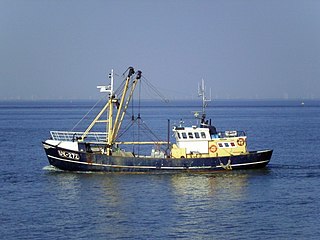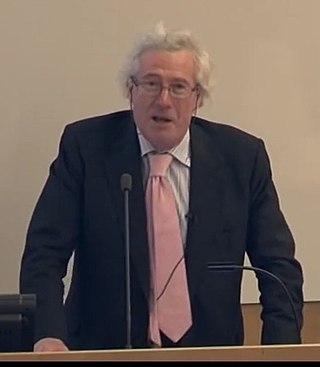
R v Secretary of State for Transport was a judicial review case taken against the United Kingdom government by a company of Spanish fishermen who claimed that the United Kingdom had breached European Union law by requiring ships to have a majority of British owners if they were to be registered in the UK. The case produced a number of significant judgements on British constitutional law, and was the first time that courts held that they had power to restrain the application of an Act of Parliament pending trial and ultimately to disapply that Act when it was found to be contrary to EU law.

Jonathan Philip Chadwick Sumption, Lord Sumption,, KC, is a British author, medieval historian, former senior judge who sat on the Supreme Court of the United Kingdom between 2012 and 2018, and a current Non-Permanent Judge of the Hong Kong Court of Final Appeal since 2019.

The Working Time Directive2003/88/EC is a European Union law Directive and a key part of European labour law. It gives EU workers the right to:
Thoburn v Sunderland City Council is a UK constitutional and administrative law case, concerning the interaction of EU law and an Act of Parliament. It is important for its recognition of the supremacy of EU law and the basis for that recognition. Though the earlier Factortame had also referred to Parliament's voluntary acceptance of the supremacy of EU law, Thoburn put less stress on the jurisprudence of the ECJ and more on the domestic acceptance of such supremacy; Lord Justice Laws suggested there was a hierarchy of "constitutional statutes" that Parliament could only expressly repeal, and so were immune from implied repeal.

The primacy of European Union law is a legal principle establishing precedence of European Union law over conflicting national laws of EU member states.

United Kingdom administrative law is part of UK constitutional law that is designed through judicial review to hold executive power and public bodies accountable under the law. A person can apply to the High Court to challenge a public body's decision if they have a "sufficient interest", within three months of the grounds of the cause of action becoming known. By contrast, claims against public bodies in tort or contract are usually limited by the Limitation Act 1980 to a period of 6 years.

Robert John Reed, Baron Reed of Allermuir, is a Scottish judge who has been President of the Supreme Court of the United Kingdom since January 2020. He was the principal judge in the Commercial Court in Scotland before being promoted to the Inner House of the Court of Session in 2008. He is an authority on human rights law in Scotland and elsewhere; he served as one of the UK's ad hoc judges at the European Court of Human Rights. He was also a Non-Permanent Judge of the Court of Final Appeal of Hong Kong.

The United Kingdom constitutional law concerns the governance of the United Kingdom of Great Britain and Northern Ireland. With the oldest continuous political system on Earth, the British constitution is not contained in a single code but principles have emerged over centuries from common law statute, case law, political conventions and social consensus. In 1215, Magna Carta required the King to call "common counsel" or Parliament, hold courts in a fixed place, guarantee fair trials, guarantee free movement of people, free the church from the state, and it enshrined the rights of "common" people to use the land. After the English Civil War and the Glorious Revolution 1688, Parliament won supremacy over the monarch, the church and the courts, and the Bill of Rights 1689 recorded that the "election of members of Parliament ought to be free". The Act of Union 1707 unified England, Wales and Scotland, while Ireland was joined in 1800, but the Republic of Ireland formally separated between 1916 and 1921 through bitter armed conflict. By the Representation of the People Act 1928, almost every adult man and woman was finally entitled to vote for Parliament. The UK was a founding member of the International Labour Organization (ILO), the United Nations, the Commonwealth, the Council of Europe, and the World Trade Organization (WTO).

An Act of Parliament in the United Kingdom is primary legislation passed by the UK Parliament in Westminster, London.

The Data Retention Directive, later declared invalid by the European Court of Justice, was at first passed on 15 March 2006 and regulated data retention, where data has been generated or processed in connection with the provision of publicly available electronic communications services or of public communications networks. It amended the Directive on Privacy and Electronic Communications. According to the Data Retention Directive, EU member states had to store information on all citizens' telecommunications data for a minimum of six months and at most twenty-four months, to be delivered on demand to police authorities.

The constitution of the United Kingdom comprises the written and unwritten arrangements that establish the United Kingdom of Great Britain and Northern Ireland as a political body. Unlike in most countries, no official attempt has been made to codify such arrangements into a single document, thus it is known as an uncodified constitution. This enables the constitution to be easily changed as no provisions are formally entrenched.

Parliamentary sovereignty is an ancient concept central to the functioning of the constitution of the United Kingdom but which is also not fully defined and has long been debated. Since the subordination of the monarchy under parliament, and the increasingly democratic methods of parliamentary government, there have been the questions of whether parliament holds a supreme ability to legislate and whether or not it should.
Parliamentary sovereignty, also called parliamentary supremacy or legislative supremacy, is a concept in the constitutional law of some parliamentary democracies. It holds that the legislative body has absolute sovereignty and is supreme over all other government institutions, including executive or judicial bodies. It also holds that the legislative body may change or repeal any previous legislation and so it is not bound by written law or by precedent.
Primary legislation and secondary legislation are two forms of law, created respectively by the legislative and executive branches of governments in representative democracies. Primary legislation generally consists of statutes, also known as 'acts', that set out broad principles and rules, but may delegate specific authority to an executive branch to make more specific laws under the aegis of the principal act. The executive branch can then issue secondary legislation, creating legally enforceable regulations and the procedures for implementing them.

The European Union (Withdrawal) Act 2018 is an Act of the Parliament of the United Kingdom to repeal the European Communities Act 1972, and for parliamentary approval to be required for any withdrawal agreement negotiated between the Government of the United Kingdom and the European Union. Initially proposed as the Great Repeal Bill, its passage through both Houses of Parliament was completed on 20 June 2018 and it became law by Royal Assent on 26 June.

R (Miller) v Secretary of State for Exiting the European Union is a United Kingdom constitutional law case decided by the United Kingdom Supreme Court on 24 January 2017, which ruled that the British Government might not initiate withdrawal from the European Union by formal notification to the Council of the European Union as prescribed by Article 50 of the Treaty on European Union without an Act of Parliament giving the government Parliament's permission to do so. Two days later, the government responded by bringing to Parliament the European Union Act 2017 for first reading in the House of Commons on 26 January 2017. The case is informally referred to as "the Miller case" or "Miller I".

The history of High Speed 2 is the background to the planned construction of High Speed 2 (HS2), a new high-speed railway in Great Britain that would connect London, Birmingham, Manchester, Leeds and other cities in the UK.
The Environmental Impact Assessment Directive 2011 is an EU directive relevant for European environmental law.
The UK Withdrawal from the European Union (Scotland) Bill 2018, colloquially known as Continuity Bill within the Scottish Parliament or the EU Continuity Bill within Scotland, provided for all matters devolved under the Scotland Act 1998 and subsequent legislation that are currently under the control of the European Union, to be repatriated to the Scottish Parliament upon 'exit day'. It was referred to as the Scottish EU Continuity Bill outwith Scotland, was a passed legislative bill by the Scottish Parliament with a stated view to prepare devolved elements of Scots law in view of the United Kingdom's withdrawal from the European Union.
In public law, abrogation is the proposing away of a right, power or value, by a public body in delegating power or failing to carry out a responsibility or duty. The abrogation of such a responsibility or duty, unless required by primary legislation would amount to an unconstitutional delegation of power to a foreign government or other sovereign power.










